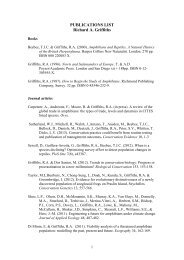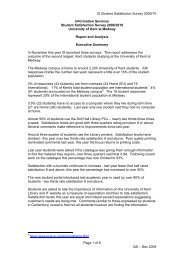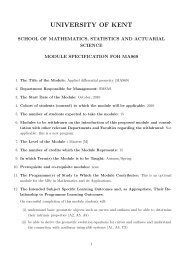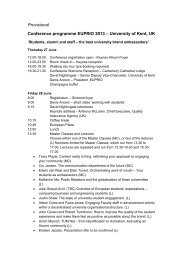cspdf, Job 181 - University of Kent
cspdf, Job 181 - University of Kent
cspdf, Job 181 - University of Kent
Create successful ePaper yourself
Turn your PDF publications into a flip-book with our unique Google optimized e-Paper software.
1986: 5) <strong>of</strong> Hellenic culture by making available to the ‘civilised world’<br />
products that have an emotional appeal. This appeal can be explained by<br />
reference to the idea that Olympiad-related products retain the ‘spirit’ <strong>of</strong> the<br />
alleged cultural donor <strong>of</strong> humanity (see also Sahlins, 1974: 169), Greece. A<br />
very good example <strong>of</strong> this is the Athens 2004 Olympic mascot. During the<br />
competition, ATHOC set a series <strong>of</strong> standards and prerequisites the mascot<br />
had to fulfil. We note that alongside mundane, economic, criteria (such as<br />
‘electronic replication potential’ <strong>of</strong> the proposed image), the mascot ought to:<br />
Be the Athens 2004 ambassador to the world<br />
Reflect the Athens 2004 vision and values<br />
Reflect the values <strong>of</strong> Olympism<br />
Be unique<br />
Promote the Image <strong>of</strong> Athens and Greece (Athens 2004)<br />
Indeed, the chosen mascots were two dolls (Athena and Phevos) that<br />
embodied all these ideals. ‘Their creation was inspired by an ancient Greek<br />
doll’, the <strong>of</strong>ficial 2004 website informs us. ‘Their names are linked to ancient<br />
Greece. And yet the two siblings are children <strong>of</strong> modern times. [...] Phevos is<br />
the name <strong>of</strong> the Olympian god <strong>of</strong> light and music, known as Apollo. Athena<br />
[is] goddess <strong>of</strong> wisdom and patron <strong>of</strong> the city <strong>of</strong> Athens’. In this way, Phevos<br />
and Athena represent the link between Greek history and the modern Olympic<br />
Games. The website provides an extensive history <strong>of</strong> these dolls and<br />
illustrations <strong>of</strong> the original religious idols by which they were inspired (Athens<br />
2004). The Hellenic heritage is thus re-appropriated by modern Greeks, who<br />
assert their modernity through a shadowy antiquity. For the Greeks what is<br />
marketised has an uncontested universal appeal and symbolic meaning.
















